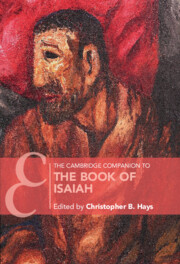Book contents
- The Cambridge Companion to the Book of Isaiah
- Frontispiece
- Cambridge Companions to Religion
- The Cambridge Companion to the Book of Isaiah
- Copyright page
- Contents
- Notes on Contributors
- Acknowledgments
- Timeline of Events Related to the Book of Isaiah
- Abbreviations
- Maps
- 1 Introduction
- Part I The Book of Isaiah Through History
- Part II Isaiah in Its Cultural World
- Part III Isaiah as Literature
- Part IV Afterlives of the Book of Isaiah
- 16 Theological Tensions in the Book of Isaiah
- 17 The Ethical and Political Vision of Isaiah
- 18 Isaiah in the New Testament
- 19 Impressions of Isaiah in Classical Rabbinic Literature
- 20 The Reception History of Isaiah
- Scripture Index
- Other Texts Index
- Subject Index
- Cambridge Companions to Religion ()
- References
20 - The Reception History of Isaiah
Unsealing the Book
from Part IV - Afterlives of the Book of Isaiah
Published online by Cambridge University Press: 08 November 2024
- The Cambridge Companion to the Book of Isaiah
- Frontispiece
- Cambridge Companions to Religion
- The Cambridge Companion to the Book of Isaiah
- Copyright page
- Contents
- Notes on Contributors
- Acknowledgments
- Timeline of Events Related to the Book of Isaiah
- Abbreviations
- Maps
- 1 Introduction
- Part I The Book of Isaiah Through History
- Part II Isaiah in Its Cultural World
- Part III Isaiah as Literature
- Part IV Afterlives of the Book of Isaiah
- 16 Theological Tensions in the Book of Isaiah
- 17 The Ethical and Political Vision of Isaiah
- 18 Isaiah in the New Testament
- 19 Impressions of Isaiah in Classical Rabbinic Literature
- 20 The Reception History of Isaiah
- Scripture Index
- Other Texts Index
- Subject Index
- Cambridge Companions to Religion ()
- References
Summary
Brennan Breed’s “The Reception History of Isaiah: Unsealing the Book” takes a single theme attested in just a few verses (Isa 8:16; 29:11; and 30:8) and shows how it has been reinterpreted by readers ceaselessly across the centuries, all the way from later biblical authors to modern times, in response to everything from sectarian divisions to African-American slavery to the trauma of the Holocaust. These verses refer to the words of the prophet being sealed, especially to those who are ignorant, until the time comes for their meaning to be revealed. This theme brings into focus the ways in which Isaiah has been used polemically, and it also points to the text’s power as a seemingly inexhaustible well of meaning.
- Type
- Chapter
- Information
- The Cambridge Companion to the Book of Isaiah , pp. 326 - 344Publisher: Cambridge University PressPrint publication year: 2024

